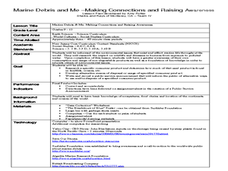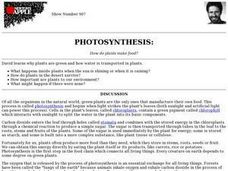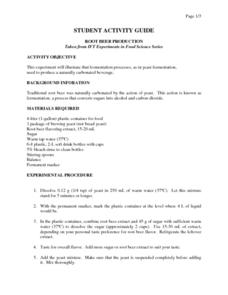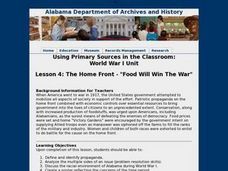Curated OER
Marine Debris and Me
Students study the environmental issues that pertain to the marine environment. In this research ocean landfills lesson students come up with alternative means of disposal.
Curated OER
Goods and Services
Second graders demonstrate their understanding of goods and services through group presentation. In this simplified economics lesson plan, 2nd graders are divided into groups representing a particular market. They then create posters...
Curated OER
Agriculture Scavenger Hunt
In this science worksheet, students find the words that are related to the finding of terms and information about agriculture for ten questions. The answers are on page 3.
Curated OER
Estimating and Counting Money
Students explore the concepts of estimating and rounding. In this estimating and rounding lesson, students play a game of tic-tac-toe. Students pick items and must estimate their cost by rounding. Students estimate the costs of pretend...
Curated OER
Using Menus
Students practice foreign language vocabulary and problem solving, by asking questions and ordering from a menu. Working in pairs, students role play activities related to ordering from a menu in a foreign language. Activities for...
Curated OER
"From farm to plate"
Students identify sources of food and the bacteria associated with them. They comprehend how bacteria in the food chain can cause disease. Students comprehend the importance of proper food-hygiene practices throughout the many stages of...
Curated OER
The Portion is the Poison
Middle schoolers calculate the amount of everyday food products or liquids that would need to be consumed in order to become toxic. By using unit analysis, they calculate the amount of certain common food items that would need to be...
Curated OER
From Farm to Table
It's important for students to understand where our food comes from and the environmental implications of agriculture.
Curated OER
Read That Label!
Students explore reading nutritional labels and making good food choices through simulation. They prepare and design a label for a product. In addition, they create packaging and advertising to ensure access to the population.
Curated OER
What Would Halloween be Like Without the Ecuadorian Rainforest?
Fourth graders are given a number of typical Halloween treats and work in groups to determine which foods came from the Rainforest (chocolate) and which foods came from temperate regions (apples, popcorn) and treats that don't have...
Curated OER
Why Eat Organic?
Ninth graders explore the concept of organic eating. In this environmental stewardship lesson, 9th graders compare and contrast organic foods with conventional foods and discuss the benefits of eating organic foods.
Curated OER
How Far Did It Travel?
Sixth graders read and discuss background and vocabulary. They use the background to develop a flow chart showing the movement of food from farm to table and work independently or in groups to complete an activity. They then use Internet...
Curated OER
How Did That Get in My Lunch?
Learners view "The Danger Zone" to learn about food poisoning and the bacterial causes and prevention. Students look at slides, use a worksheet, "Microbial Bugs"and the internet to identify and learn about each bacterium.
Curated OER
All Wrapped Up
Pupils work in teams to identify and sort types of packaging used in food production. They consider ways to reduce the environmental impact of packaging and reflect how consumer choices play a role in trash production.
Curated OER
Honey ! I Blew Up The Bee!
Second graders complete a variety of bee-themed activities. They consider the importance of honeybees in food production, conduct Internet research, prepare foods using honey, complete puzzles and compile a portfolio of their work.
Curated OER
CALORIE COUNTDOWN
Pupils will categorize foods according to their components and energy content.1. Design a large bulletin board with sections for carbohydrates, fats and proteins.
2. Ask students to bring labels and packages of different food products....
Curated OER
Microbial Spoilers: The Impact of Microorganisms on the Shelf-life of Milk
Learners are inroduced to a commonly used microbial culturing technique. They explore the role of microorganisms in determining the shelf-life of food products.
Curated OER
Hazardous Products Substitutes
Students investigate toxic substances. In this health lesson, students identify warning labels on common household cleaners and create a "less toxic" cleaning recipe book. Students recite a pledge to try a less toxic substitute at home.
Curated OER
Photosynthesis: How do plants make food?
Students study why plants are green and how water is transported in them. They examine how plants respond to different amounts of light.
Curated OER
Photosynthesis: Intake of Carbon Dioxide - Production of Oxygen
Students, after a long-term observation of photosynthesis with aquatic plants, assess the benefits of photosynthesis towards all living organisms. They explain in their own words the two cycles within photosynthesis. Guided discussion...
Curated OER
Root Beer Production
In this fermentation worksheet, students conduct an experiment to illustrate how the yeast fermentation process is used to produce carbonation. This worksheet has 5 short answer questions.
Curated OER
The Home Front - "Food Will Win The War"
Students define and identify propaganda. They analyze the multiple sides of an issue (problem resolution skills), then discuss the racial environment of Alabama during World War I. They reate a poster reflecting the concerns of the time...
DiscoverE
Squishy Circuits
Make electricity flow through Play-Doh. Individuals create animals or other creatures using Play-Doh. The engineering aspect? Eyes that light up and Play-Doh that conducts electricity.
Smarter Than Smoking
Secrets They Keep Poster
A colorful, thought-provoking infographic identifies 12 harmful chemicals found in cigarette smoke. It provides a sober warning for smokers and those exposed to secondhand smoke.
Other popular searches
- Food Production Flow Charts
- Food Production by Continent
- Hormones & Food Production
- Plant Food Production
- Food Production Chain
- Food Production Plan
- Energy and Food Production
- Tree Food Production
- Food Production Oil
- Mass Production Food
- Anthropology Food Production
- Bacteria in Food Production

























